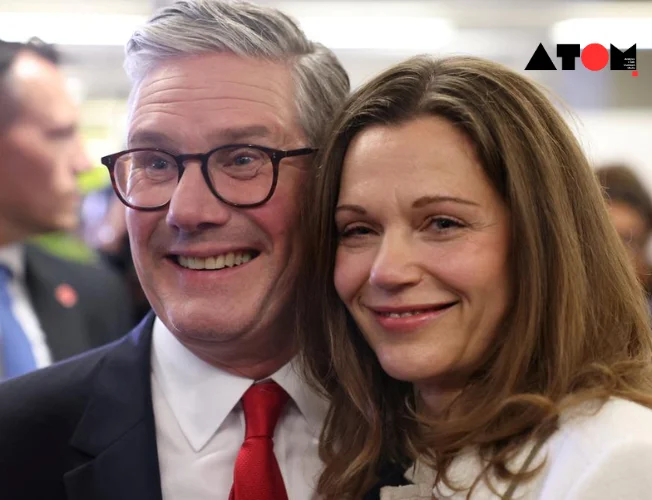In a historic turn of events, Sir Keir Starmer has become the UK’s new Prime Minister after his Labour Party achieved a sweeping victory in the general election. This dramatic shift marks the end of a tumultuous 14-year Conservative reign, which saw five different Prime Ministers in power.
Rishi Sunak’s Concession
Resigning Prime Minister Rishi Sunak took to the stage outside 10 Downing Street in the pouring rain and apologized for the Conservative Party’s crushing defeat. In the upcoming weeks, he will announce his retirement as party leader and apologize to his colleagues. This event marked the conclusion of a difficult time for the Conservatives that was marked by both political unrest and economic distress.
Labour’s Promises and Starmer’s Vision
Sir Keir Starmer stressed putting the nation first and promised “national renewal” in his victory address. “To rekindle the fire, we have earned the mandate,” Starmer exclaimed to cheering Labour fans in London. In stark contrast to the 2019 election, which saw Labour under Jeremy Corbyn suffer its worst loss in almost a century, he pledged to reinvigorate the ideas that unite the nation.
Conservative Party’s Collapse
The Conservative Party’s collapse was profound, with former minister Robert Buckland describing it as “electoral Armageddon.” The party’s performance is their worst in almost 200 years, prompting an imminent ideological battle over its future direction.
Labour’s Significant Gains
The amazing result for Labour is that it won 412 seats out of the 650 members of the House of Commons. The centrist Liberal Democrats won 71 seats, while the Conservatives fell to just 120 seats. The Green Party and Reform UK, the Brexit Party’s replacement, each took home four seats. The Scottish National Party’s (SNP) slide to just nine seats as a result of financial scandals contributed to Labour’s win.
Notable Election Defeats
On election night, a number of well-known losses occurred. Labour just defeated former prime minister Liz Truss in her bid to retain the South West Norfolk seat, which she held for just 49 days before being removed. Jacob Rees-Mogg, the leading Brexiteer, lost his seats in East Somerset and Hanham after acknowledging he was solely to responsible for the outcome. The House Leader Penny Mordaunt, Defence Secretary Grant Shapps, Education Secretary Gillian Keegan, Culture Secretary Lucy Frazer, and Veterans Minister Johnny Mercer were among the other prominent Conservative losses.
With a smaller majority, Chancellor Jeremy Hunt kept his position in spite of these huge defeats. In his acceptance speech, Rishi Sunak, who also won his seat in Yorkshire, acknowledged that the election was a total defeat.
Transition of Power
Power changes in British politics happen quickly. On Friday morning, Sir Keir Starmer was sworn in as the new prime minister shortly after King Charles III and Rishi Sunak parted ways at Buckingham Palace. Following his appointment, Starmer made his customary trip up Downing Street to address the country and start assembling his new government.
Keir Starmer’s Background
Keir Starmer’s rise in politics is relatively recent. He started his professional life as a barrister in the 1990s and became the Director of Public Prosecutions in 2008. He entered Parliament in 2015, representing the Holborn and St Pancras constituency, and took over Labour’s leadership after their 2019 electoral defeat. In his victory speech, Starmer emphasized the public’s desire for change and promised to end the “politics of performance.”
Nigel Farage’s Political Milestone
Nigel Farage, leader of Reform UK, finally won a seat in Parliament on his eighth attempt. Although Reform UK initially projected to win 13 seats, they secured four, marking a significant achievement compared to their predecessors, UKIP and the Brexit Party. Farage celebrated the party’s 14% vote share, despite controversies during the campaign over offensive statements by some candidates.
The Road Ahead for Labour
The new Labour government faces numerous challenges, including strained public finances and a stretched National Health Service. Starmer’s administration has promised immediate action to grow the economy and invest in key areas such as health and education, while also balancing the books after the economic impacts of COVID-19 and the Ukraine crisis.
The 2024 UK general election has ushered in a new era of Labour leadership under Keir Starmer, ending 14 years of Conservative rule. As the nation looks forward to the changes promised by the new government, the political landscape in Britain is set for a significant transformation. Starmer’s pledge for national renewal and the public’s clear demand for change will shape the country’s future in the coming years.
Read more: Marketing News, Advertising News, PR and Finance News, Digital News





